Films from the country "espagne", sorted by revenue
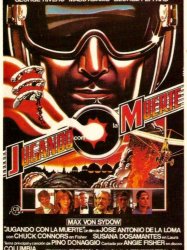
Target Eagle (1982)
, 1h40Origin Espagne
Genres Action, Adventure, Crime
Actors Maud Adams, Jorge Rivero, Susana Dosamantes, George Peppard, Max von Sydow, Chuck Connors
Les services secrets espagnols recrutent le mercenaire surnommé « L'Aigle » pour infiltrer une bande de trafiquants d'héroïne. Parfaitement intégré à l'organisation, il découvre que celle-ci est aussi impliquée dans la contrebande d'uranium pour fabriquer des armes nucléaires destinées à la Libye et à d'autres pays émergents...

From Hell to Victory (1979)
, 1h39Directed by Umberto Lenzi
Origin Espagne
Genres War, Action
Actors George Peppard, George Hamilton, Horst Buchholz, Jean-Pierre Cassel, Capucine, Anny Duperey
In 1939 six friends take drinks in a suburb of Paris and promise each other to meet again once World War II is over. Two of them are French, two others are Americans, one is a German and another one is British. All of them fight in the war and after the Liberation of Paris only three of them live to keep their promise.
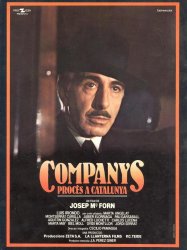
Companys, procés a Catalunya (1979)
Directed by Josep Maria Forn
Origin Espagne
Genres Drama, Historical
Actors Montserrat Carulla, Xabier Elorriaga, Agustín González, Marta Flores, Juanjo Puigcorbé, José Lifante
Le film dépeint le procès fait en 1940 à Lluís Companys, Président de la Generalitat de Catalogne, entre son arrestation et son exécution.
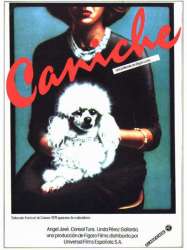
Poodle (1979)
, 1h26Directed by Bigas Luna
Origin Espagne
Genres Comedy
Angel et sa sœur Eloisa vivent dans une grande maison héritée d'une vieille tante récemment décédée. Petit à petit, une étrange relation se met en place entre eux deux et Dani, un caniche un peu trop présent...

Cria! (1976)
, 1h50Directed by Carlos Saura
Origin Espagne
Genres Drama
Themes Films about children
Actors Ana Torrent, Geraldine Chaplin, Héctor Alterio, Mirta Miller, Florinda Chico, Mónica Randall
Eight-year-old Ana, stoic and quiet approaches her father's bedroom where she hears a woman in bed with her father, confessing her love for him. Descending the stairs, she spies an attractive middle-aged woman, hastily dressing and rushing from the bedroom to the front door of the darkened house. The woman and Ana exchange glances but do not speak. Once the woman has left, Ana enters her father's bedroom and finds the man dead, apparently from a heart attack. As if not really understanding the gravity of the situation, Ana unflappably takes away a half-full glass of milk, which she carries to the kitchen and cleans. In the kitchen, she sees her mother, who chides her for being up so late and sends her off to bed.
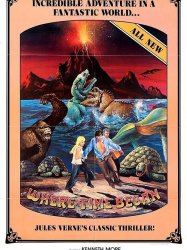 , 1h30
, 1h30Origin Espagne
Genres Science fiction, Fantastic, Adventure
Themes Films about animals, Dinosaur films, La préhistoire, Films based on science fiction novels, Animaux préhistoriques
Actors Kenneth More, Frank Braña, Jack Taylor, Emiliano Redondo, José María Caffarel, Ricardo Palacios
Whilst visiting a book shop, Professor Otto Lindenbrock (Moore) buys an old book containing undisclosed knowledge of the center of the earth from a mysterious gentleman. Eager to know more, he enlists, his niece Glauben and her lover Axel. Upon arriving in Iceland, they hire shepherd and mountaineer, Hans. Together, the four of them set off for an adventure of their lifetime...
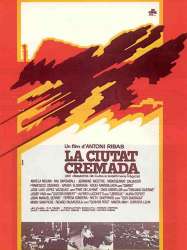
The Burned City (1976)
, 2h36Directed by Antoni Ribas
Origin Espagne
Genres Drama, Historical
Actors Ángela Molina, José Luis López Vázquez, Xabier Elorriaga, Adolfo Marsillach, José Vivó, Teresa Gimpera Flaquer
Le film narre les évènements historiques qui se déroulèrent à Barcelone entre 1899 et 1909, de l'arrivée des soldats de la guerre hispano-américaine jusqu'au émeutes connues sous le nom de semaine tragique. Autour de la famille Palau, vitrine de la bourgeoisie catalane et du développement économique de l'époque, se succèdent les fait politiques et sociaux les plus importants de la période.

A Long Return (1975)
, 1h56Directed by Pedro Lazaga
Origin Espagne
Genres Drama, Science fiction, Romance
Themes Medical-themed films, Films set in the future
Actors Mark Burns, Lynne Frederick, Charo López, George Rigaud, Adriano Domínguez, Fernando Hilbeck
A young vibrant college student, Anna (Lynne Frederick), catches eye of architect, David Ortega (Mark Burns), at an orchestra show. She quickly falls in love with him and eventually wins his love. The two become inseparable and fall madly in love with each other and marry. Soon after, Anna begins acting strange and begins experiencing sudden fatigue and memory loss (even forgetting her best friend). It is then her husband learns that she has a rare and deadly disease of the nervous system that is quickly killing her. While in the hospital, with her husband by her bed side, Anna suddenly goes into a state of a coma. Doctors tell David she has less than days to live. He pleads to the Doctor for help of any kind and they inform David that Anna's only chance of survival is to put her in a state of perpetual deep sedation, which would shut down her body and practically freeze her in time and prevent her from aging, until a cure can be found for her disease. With great optimism, David accepts and his wife is put in a state of sedation. For forty agonizing and heart acing years, David remains faithful to Anna and waits for a cure to be found while Anna’s friends and family move on with their lives, even as going as far as wanting to pull the plug on her and bury her, as she remains sedated. A cure is finally found in 2014, forty years later, and she is successfully taken out of sedation and fully cured. When Anna awakens she is kept at the hospital for observations. She repetitively asks to see her husband, not knowing he is now middle aged and that she has been in sedation for forty years, but the doctor keeps denying her request. The ice is broken when her best friend, Irene (now well past her 60s), visits her and informs her of what has happened in the last forty years (such events like Anna’s parents dying and the changes David has succumb to with age). When she is released from the hospital Irene takes her to David, and much to his delight, Anna greets him with overflowing love and affection as he welcomes her back with open arms. Later that night David expresses his trepidation and guilt of the age difference in their relationship. Anna reassures David that her love for him is still in there and tells him she loves him even more for him remaining faithful to her all those years. The couple has only a short time together as David dies (possibly of heart failure or old age) a few days later. After David’s death, Anna’s doctor comes by the house, asking the grief-stricken widow, where she will go from here. She replies, in a sorrowful manner, “Go on living.” Anna then has a flash back to her first date with David when he gave Anna her motto (“Today is the first day of the rest of your life”). She then tearfully glances at the doctor and utters to him “Today is the first day of the rest of my life,” knowing David would want her to go on living her life.

Count Dracula's Great Love (1973)
, 1h25Directed by Javier Aguirre
Origin Espagne
Genres Horror
Themes Films about magic and magicians, Dracula films, Vampires in film
Actors Paul Naschy, Haydée Politoff, Mirta Miller, José Manuel Martín, Álvaro de Luna, Cassandra Peterson
Count Dracula's Great Love opens outside a creepy old smoke-filled sanitarium in the Carpathian mountains as two delivery men arrive with a large, heavy man-shaped crate. The owner, Doctor Wendell Marlow (Paul Naschy), has just purchased the sanitarium but has not yet moved in. Realizing that these rich castle-owning types have money and jewels just lying around, they decide to wander about and see if there is anything they can steal. One is struck in the head with an axe and the other gets his throat ripped out by a man in a black cape with velvet lining.
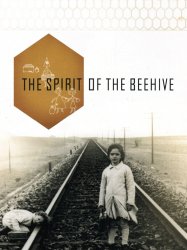
The Spirit of the Beehive (1973)
, 1h37Directed by Victor Erice
Origin Espagne
Genres Drama, Comedy-drama, Fantasy
Themes Films about children, Frankenstein films, Political films
Actors Fernando Fernán Gómez, Ana Torrent, Teresa Gimpera Flaquer, Laly Soldevila, Miguel Picazo
Six-year-old Ana is a shy girl who lives in the manor house in an isolated Spanish village on the Castilian plateau with her parents Fernando and Teresa and her older sister, Isabel. The year is 1940, and the civil war has just ended with the Francoist victory over the Republican forces. Her aging father spends most of his time absorbed in tending to and writing about his beehives; her much younger mother is caught up in daydreams about a distant lover, to whom she writes letters. The entire family is only ever seen together in a single shot towards the end of the movie, there is no discussion. Ana's closest companion is Isabel, who loves her but cannot resist playing on her little sister's gullibility. Teresa writes to her past lover while she seems to stare out the window at the old house where Ana will find the republican soldier: "Little but the walls remain of the house you once knew, I often wonder what became of everything we had there." This supposes the house has a history for her, and implies the escaped republican soldier who will run straight to this now empty and crumbling house and hide in it may have been her lover.

Frankenstein's Bloody Terror (1968)
, 1h28Origin Espagne
Genres Horror
Themes Films about animals, Films about magic and magicians, Wolves in film, Werewolves in film, Vampires in film, Mise en scène d'un mammifère
Actors Paul Naschy, Carlos Casaravilla, José Nieto
A drunken Gypsy couple spending the night in the abandoned Wolfstein castle accidentally resurrect the werewolf Imre Wolfstein when they remove the silver cross from his corpse. Once alive, he not only kills the Gypsy couple, but also wreaks havoc on a nearby village. The villagers attribute the attack to ordinary wolves, and in response, form a hunting party to kill off the animals. While on the hunt, Count Waldemar Daninsky is attacked by Imre Wolfstein and is afflicted with lycanthropy. After killing innocent victims in the midst of his transformation, he seeks help from specialists, Dr. Janos de Mikhelov and his wife, who turn out to be two vampires, who then prey on both Janice and Rudolph, Waldemar's friends. The vampires revive the first werewolf, Imre, from the dead, and force the two werewolves to battle each other. Waldemar kills Imre Wolfstein with his fangs and then destroys the two vampires, only to be killed in turn by a bullet fired by Janice, the woman who loved him most.
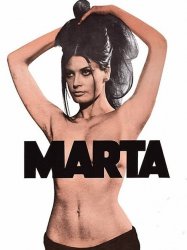
Marta (1971)
, 1h36Directed by José Antonio Nieves Conde
Origin Espagne
Genres Drama, Thriller, Horror
Themes Théâtre, Films based on plays
Actors Stephen Boyd, Marisa Mell, George Rigaud, Jesús Puente, Isa Miranda, Howard Ross
Miguel (Stephen Boyd), un homme fortuné, a de sérieux problèmes avec la gent féminine à commencer par sa mère. Il sombre progressivement dans la démence en commençant par enlever des femmes puis en les suppliciant dans sa (secrète) chambre des tortures.

Neurosis (1970)
, 1h40Directed by Julio Diamante
Origin Espagne
Genres Drama, Thriller, Horror
Actors Valérie Lagrange, Gérard Barray, Teresa Gimpera Flaquer, Eduardo Fajardo
À Barcelone, un couple se délite et le mari s’éprend de la cousine de sa femme. Pour dissimuler la mort accidentelle de cette dernière, la cousine prend son identité. Mais un soir le mari croit reconnaître son épouse dans la rue…
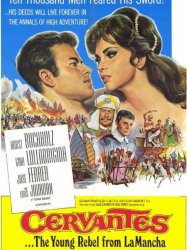
Cervantes (1967)
, 1h30Directed by Vincent Sherman
Origin Espagne
Genres Biography, Adventure, Historical
Themes Films about writers
Actors Horst Buchholz, Gina Lollobrigida, José Ferrer, Louis Jourdan, Francisco Rabal, Fernando Rey
Au XVI siècle, on assiste aux exploits et aux amours du jeune et fougueux Miguel de Cervantes, futur auteur de Don Quichotte. De ses démêlés avec le cardinal Giulio Acquaviva et l’Ottoman Hassan Bey, en passant par son alliance avec le pape Pie IV, par ses amours contrariées avec la belle courtisane romaine Giulia, par son combat auprès de Philippe II d’Espagne contre les Maures, par sa bravoure à la bataille navale de Lépante où il perd l’usage de son bras gauche, mais gagne une pension, jusqu’à sa capture en même temps que son frère Rodrigo par des pirates et leur emprisonnement à Alger par Hassan Bey. Miguel ayant acquis une renommée du fait de ses exploits guerriers, Hassan Bey monnaye la libération des deux frères contre rançon à leur famille, mais également au roi d’Espagne. Durant cette négociation, Hassan Bey réduit les deux frères en esclavage, mais Miguel fomente une rébellion, ce qui lui vaut d’être soumis à la torture puis condamné à mort. Heureusement, la rançon est payée juste avant son exécution et Hassan Bey rend leur liberté aux frères Cervantes qui peuvent enfin regagner leur pays.
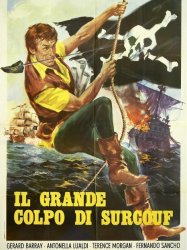
The Big Hit of Surcouf (1966)
, 1h39Directed by Roy Rowland, Sergio Bergonzelli
Origin Espagne
Genres Adventure
Themes Seafaring films, Transport films
Actors Gérard Barray, Terence Morgan, Antonella Lualdi, Giani Esposito, Armand Mestral, Gerard Tichy
Le corsaire Robert Surcouf, chargé d’une mission secrète par Napoléon, s’attaque aux Anglais qui détiennent la citadelle de l’île de Mahé dans l'océan Indien. Il réussit sa mission, mais son frère cadet Nicolas est capturé. Surcouf va le délivrer grâce à l’aide de Margaret, son amour de naguère, devenue l’épouse du gouverneur de l’île, Lord Blackwood, son ennemi juré…
 Connection
Connection